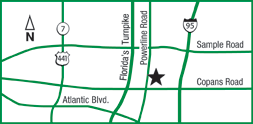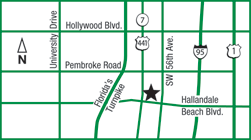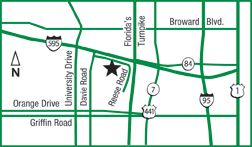The Broward County Residential Drop-off Centers accepts Household Hazardous Waste and Electronics ONLY from participating municipalities on Saturdays, from 9AM to 3PM.
Broward County's Household Hazardous Waste Participating Cities:
-
Broward Municipal Services District
-
Dania Beach
-
Davie
-
Hollywood
-
Lauderhill
-
Lazy Lake
-
Lighthouse Point
-
Margate
-
North Lauderdale
-
Oakland Park
-
Parkland
-
Pembroke Park
-
Sea Ranch Lakes
-
Weston
-
West Park
If your city is not listed above and you have questions about residential yard waste and bulk waste drop-off, contact your city's Public Works Department.
If you reside in a participating city and wish to make a drop off, please bring proof of residency (photo ID and a document that shows your official address such as a tax bill, TRIM notice, voter registration, utility bill, or other official government-issued document).
Drop-Off Centers For Residents Of Participating Cities

North Drop-Off Center
2780 N. Powerline Road
Pompano Beach, FL 33069
Saturdays only, 9 a.m. - 3 p.m.
 South Drop-Off Center
5601 W. Hallandale Beach Blvd.
West Park, FL 33023
Saturdays only, 9 a.m. - 3 p.m.
| 
Central Drop-Off Center
5490 Reese Road
Davie, FL 33313
Saturdays only, 9 a.m. - 3 p.m.
|
ITEMS THAT ARE ACCEPTED:
Aerosol products
Ammonia
Ammunition
Antifreeze
Auto fluids
Auto batteries
Boat batteries
Boat fluids
Charcoal starter
Compact fluorescent lamps (CFLs)
Drain cleaners
Fertilizer
Fire extinguishers | Fireworks
Flares
Fluorescent tubes
Gasoline
Herbicides
Household cleansers
Insecticide
Kerosene
Lawn chemicals
Lighter fluid
Mercury thermometers
Motor oil
Nail polish & remover
Paint | Pesticides
Photo chemicals
Pool chemicals
Propane tanks
Rechargeable batteries
Rust remover
Solvents
Spot remover
Tires*
Turpentine
Weed killer
Wood stain
Wood stripper
|
*Maximum of 5 tires accepted per load with rims less than 25 inches in diameter
*Containers may not exceed five gallons; limit 25 gallons per visit
YOU MAY ALSO DROP OFF THE FOLLOWING ELECTRONICS:
Answering machines, computer cables, cell phones, computers (including laptops), copiers, DVD and VCR players, fax machines, flash and hard drives, keyboards/mice, monitors, pagers, print cartridges, printers, radios, routers, satellite/cable boxes, scanners, speakers/stereos, telephones, televisions, wires,
ITEMS THAT ARE NOT ACCEPTED:
Business-and government-generated waste, explosives, biohazardous waste.
Visit
Electronics Recycling for more information.
Disposal Guidelines for Other Items
Chemical Disposal for Businesses and Government Agencies
Small businesses (including home-based), government agencies and non-profits that generate hazardous waste and/or electronics should not bring waste to any Broward County facility. For information, please call 954-765-4999 or 954-357-8850.
Compact Fluorescent Lamps (CFLs)
If you accidentally break a fluorescent bulb or tube, safely dispose of it by following EPA guidelines for
Cleanup and Disposal of broken CFL's.
Medication Disposal
Do not dispose of prescription medications by flushing them down a toilet or drain, as this will contaminate our water system. For information about local medication disposal, call 954-831-8902 or visit the
Broward Sheriff's Office website.
Sharps (Needle) Disposal
Sharps are considered biohazardous waste and should never be thrown directly into the trash. For information about their safe disposal and a list of sites accepting sharps, visit
Florida Health Department.
Rechargeable Batteries
Cell phones, remote control toys, laptops and power tools are just a few household items that use
rechargeable batteries, which contain cadmium or lithium, both of which are considered toxic heavy metals. It is illegal to dispose of rechargeable batteries in regular trash. Visit
Call2Recycle.org for a list of drop-off sites.
Regular Household Batteries
Common household alkaline batteries no longer contain mercury and are safe to dispose of in your regular garbage.
